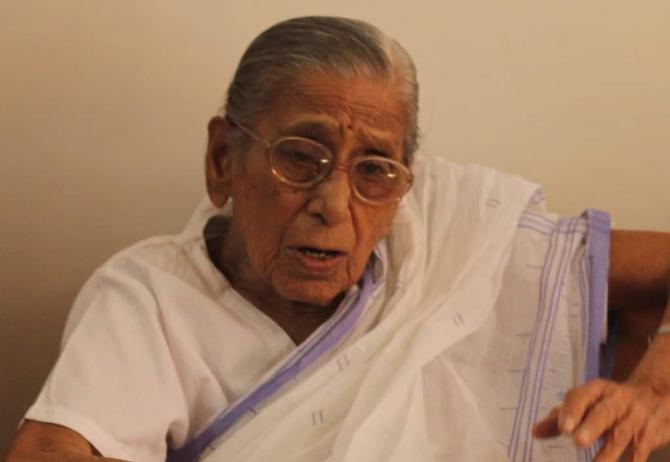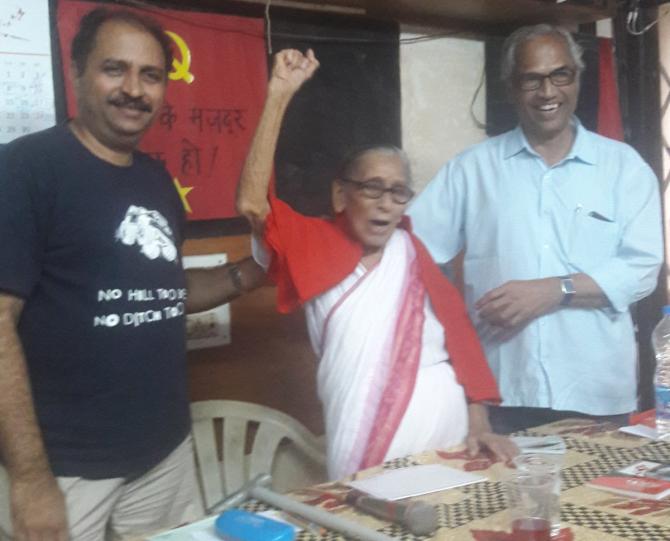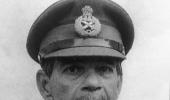Sunder Navalkar devoted her whole life to the cause of workers' rights, remembers Sanober Keashwaar.

On April 9, a phenomenal woman passed away into the ages at the ripe old age of 98.
Comrade Sunder Navalkar was many-faceted -- an intransigent Communist revolutionary, a feisty trade union organiser, an indomitable street fighter, a canny labour lawyer, an indefatigable editor and publisher, and a formidable single woman.
But those like her who never seek fame tend to 'fall off' the pages of mainstream history. We need to resurrect such women so their life and work inspired generations of people to struggle to build a better world.
Born into a middle-class family of the Pathare Prabhu community (said to be the original inhabitants of the island of Mumbai), Comrade Sunder was a rebel from as far as she could remember, spending much time standing outside the classroom in the school for being 'naughty' in class! Even though her lawyer father was in the Hindu Mahasabha, as a young woman Sunder was more attracted towards the freedom struggle led by Gandhi.
Her voracious reading brought her into contact with the philosophy of Marxism and the earth-shaking events of the Russian Revolution. The writings of Lenin further convinced her that Communism was the right path to end the ills and evils of capitalism.
These convictions made her move closer to the then undivided Communist Party of India. From then on, all through her life, she kept seeking the most 'correct' political organisation for leading the masses to revolution and building a new society free of exploitation.
Her restless search would lead her first to the Revolutionary Socialist Party; then to form the Marxist Unity League in 1962; then to the newly-formed Communist Party of India-Marxist in the mid-1960s; and ultimately to join hands with other comrades to set up the first unit of the Communist Party of India (Marxist-Leninist) in Maharashtra in the 1970s.
She was its first secretary. For her Communist activities and convictions, she spent a total of seven years in prison.

Comrade Sunder's chosen field of activity was the working-class movement. From her 20s itself, she began organising workers and forming unions and fighting their cases in court as a people's lawyer. At the same time, she took great care and effort to organise study classes to imbibe the working classes with the Marxist world outlook.
In these efforts, she worked closely with her best friend, the late Pushpa Mehta (who later became the leader of the all-India trade union called UTUC. These redoubtable women comrades also set up a militant union called the Silk Workers' Union (Red Flag) in Mumbai.
Later, Comrade Sunder, along with her comrades, established a number of unions like the Woollen Mills Workers' Union, the Dockyard Expansion Workers' Union, the Defence Civilian Workers' Union and the Phillips Coffee Workers' Union.
However, her main grassroots work was among construction workers, especially on Shapurji Pallonji construction sites. She eventually set up the United Labour Union, through which construction workers and Air India's contract sweepers and cleaners at Mumbai airport were organised.
After years of struggle in the workplace and in the courts, Comrade Sunder and her comrades won a historic victory in the Supreme Court in 1996 with the landmark judgment in Air India vs United Labour Union, which held that in the event of the abolition of the contract labour system in an establishment, the principal employer had to absorb the contract workers as direct permanent labour, with the attendant benefits and security of service.
This served as a boon to thousands of contract workers throughout the country, till the judgment was reversed by the Supreme Court in the case of Steel Authority of India Ltd vs National Union Water Front Workers in 2001.
Says D Thankappan, 84 -- veteran trade unionist, president of the Kamani Workers Union and a founder-leader of the New Trade Union Initiative, who was a comrade of Comrade Sunder since he was 19: "In my long experience in the trade union movement, Comrade Sunder, apart from R Geeta of Chennai, is the only woman leader who so fully identified with the working class."
Recalls N Vasudevan, fellow-traveller and current president of the New Trade Union Initiative: "Comrade Navalkar spent her days and nights thinking of ways of energising the workers to fight for their rights. She used to be an eternal optimist and never felt demoralised, however bad the situation. She had the undying faith that one day the revolution was bound to come and we must move ahead, whatever the difficulties. And in all these endeavours, no task was too small for her."
"She would be there making placards, putting up posters all over the city at night, typing letters, attending meetings with labour commissioners, typing letters and petitions, doing her own posting and even physically resisting violent assaults by management-sponsored goondas at factory gates!" remembers Vasudevan.
"In fact, Navalkar's first term in prison (3 months) related to a case where she had physically warded off management goons at a gate-meeting of striking workers at the Shivshakti Mills in Mahalaxmi (south central Mumbai) where a strike had been going on for 3 months!"
Through her speeches, writings and constant organising, Comrade Sunder advocated a political programme for the working class of how to overturn this 'exploitative capitalist system' and establish a new egalitarian system of production and life.
In her view, trade unions were the schools where workers could prepare themselves to understand how to build and run a society of associated producers.
She was always keen to build the solidarity of the working class beyond the confines of unions, parties and issues.
Armed with this understanding, she and her comrades played an active role in mobilising support for mass struggles like the Railway Workers' all India strike in 1974, for the Dalit Panther movement in the 1970s, the Mumbai mill workers' strike in the early 1980s as also for mobilising against the Emergency 1975-1977 and for building mass political resistance to communalism during the post-Babri Masjid demolition riots of 1992-1993.

Comrade Sunder tirelessly edited and published a journal in Marathi, Jasood(messenger) from 1947 till 2019.
She attempted to present the Marxist-Leninist viewpoint on major contemporary political, economic, social issues and cultural issues. No matter where you bumped into her, she would promptly pull out a copy of the journal from her bag and sell it to you and also never forget to ask for feedback. Jasood must be the longest-running Marathi political journal in history!
Sunder also enthusiastically commissioned and published translations of some Marxist classics into Marathi, like Nadezda Krupskaya's Memories of Lenin.
She also personally translated and published the five foundational essays of Mao Tse-Tung Thought into Marathi for the first time so that they could reach a wide Marathi audience.
Comrade Sunder was true to her ideals and lived a simple, austere, life, totally rejecting mindless consumerism.
Her humble flat was sparsely furnished and she had the barest of household goods.
She was always seen in her trademark white cotton saree with border and a shirt-like blouse which was long enough to be tucked into her petticoat.
She always travelled by BEST and state transport buses throughout her life for her trade union work -- even when she was past 90 years of age!
There is an anecdote about her when, in her early 80s, she tripped and fell while in a morcha and broke her leg. She recovered and was back on her feet in a miraculously short time.
When asked what was the secret of her robust health and resilience, she smiled and replied: "Eating half a kilo of beef every Sunday!"
But what was her life like as a single woman? Even though many were curious, no one ever asked her.
The only insight we have is the advice she gave to a woman activist when the latter was coping with the end of a relationship.
Sunder told her, 'Don't grieve, Comrade. Consider yourself as being liberated from the confines of a woman's responsibilities. Concentrate all your energies on advancing the movement that will give you greater solace and satisfaction than any relationship with a man can.'
While sitting with some trade unionists a decade ago, a younger comrade advised Sunder to go easy and to take time to rest, now that she was approaching 90.
Her reply was characteristic: 'There is so much work still to be done, there is no time to rest. There will be lots of time for me to rest, once I am dead!'
When some comrades met her a year before her death, she pointed to a set of three hand-written ledgers lying on her table.
She said that these hand-written pages comprised her autobiography and that she had been brutally frank about all the people she had known and worked with.
The autobiography should only be published posthumously, Comrade Sunder asserted.
Like the woman, it promises to be one dynamite of a book!
Feature Presentation: Rajesh Alva/Rediff.com











 © 2025
© 2025